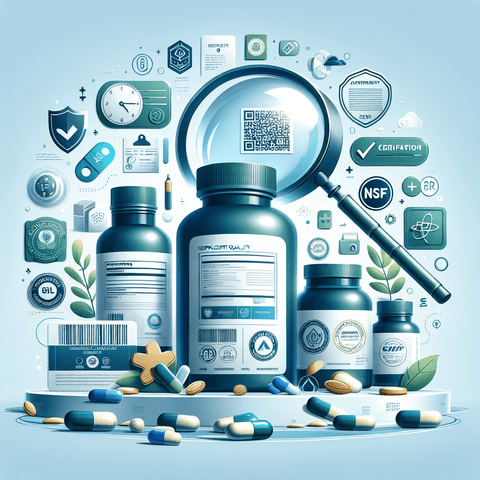Discover the Hidden Secrets to Choosing Safe and Effective Dietary Supplements
Meta Description: Unlock the secrets to selecting safe, effective dietary supplements with our expert tips. Ensure your health journey is backed by trusted advice—click to learn more!
Introduction
In recent years, dietary supplements have experienced a surge in popularity, becoming an integral part of many individuals' health and wellness routines. From boosting immunity and enhancing energy to supporting bone health and promoting overall vitality, supplements are marketed as convenient solutions to various nutritional gaps. As consumer awareness grows, so does the diversity of products available on the market, from well-known brands to obscure labels. This abundance, while promising, also introduces a spectrum of safety concerns, quality variability, and misinformation.
Choosing the right supplement is not just about picking a product off the shelf; it requires informed decision-making grounded in understanding the ingredients, manufacturing standards, and regulatory environment. The importance of making safe and effective choices cannot be overstated—poor quality or unsafe supplements may not only fail to deliver desired health benefits but could also pose significant health risks. This comprehensive guide aims to unveil the hidden secrets behind selecting supplements that truly support your health journey, emphasizing safety, quality, and efficacy.
Understanding Dietary Supplements: Your Foundation for Better Health
Dietary supplements encompass a broad category of products intended to complement the diet and support nutritional needs. They may come in various forms including capsules, tablets, powders, liquids, and more, designed to deliver concentrated nutrients or herbal compounds. According to the Dietary Supplement Health and Education Act of 1994 (DSHEA), a dietary supplement is a product taken orally that contains a dietary ingredient intended to supplement the diet.
The role of dietary supplements is to bridge nutritional gaps, support physiological functions, or provide beneficial plant-derived compounds. The main types include vitamins, minerals, herbal products, amino acids, enzymes, and specialty products like probiotics. Vitamins such as Vitamin D, essential for bone health and immune function, or Vitamin C, known for its antioxidant properties, are among the most common supplements used worldwide.
Despite their benefits, misconceptions abound. Some believe that supplements can replace a poor diet, which is not accurate. Others assume that all supplements are safe just because they are available over the counter. This false sense of security can lead to misuse, interactions with medications, or ingestion of contaminated products. Understanding the distinction between supplements that support health and those that might do more harm is crucial for safeguarding your well-being.
Choosing the right supplement should be based on personal health needs, scientific evidence, and a comprehensive understanding of the product’s safety profile. This foundation is essential for maximizing benefits and minimizing risks, ensuring your health and wellness strategy is built on trustworthy, evidence-based pillars.
Supplement Safety Tips: Prioritizing Your Well-being in the Supplement World
Safety must be at the forefront when selecting dietary supplements. As the supplement industry is less stringently regulated than pharmaceuticals, consumers are responsible for scrutinizing products for safety and quality. One of the first steps is to consult healthcare providers—especially if you are pregnant, nursing, on medications, or managing chronic conditions. Healthcare professionals can offer personalized advice tailored to your unique health profile.
Another vital aspect involves understanding potential risks and common contaminants. Some supplements may be adulterated with pharmaceutical ingredients or contain heavy metals, pesticides, or microbial contaminants. These issues are often hidden within products of dubious origin or those lacking transparency. Therefore, being cautious about the source of supplements is essential.
The U.S. Food and Drug Administration (FDA) regulates dietary supplements under DSHEA, but it does not evaluate or approve products before they reach the shelves. This means manufacturers are responsible for ensuring safety and accuracy of labeling. However, the absence of pre-market approval presents a challenge for consumers seeking trustworthy products. Recognizing this, third-party safety testing organizations such as NSF International, the United States Pharmacopeia (USP), and ConsumerLab perform rigorous testing to verify product purity, potency, and safety.
To detect adulteration or counterfeit supplements, look for recognized third-party certifications and seals on packaging. These seals serve as indicators that the product has undergone independent testing for contaminants and label accuracy. For example, a product bearing the USP Verified Mark indicates it meets strict standards for quality, safety, and potency. Similarly, NSF certification confirms that the supplement is free from banned substances and contaminants.
Always stay vigilant for red flags such as exaggerated health claims, missing or suspicious manufacturing details, or products with an overly long list of ingredients. Purchasing from reputable sources and trusted brands significantly reduces the risk of contaminations or counterfeits, promoting your safety and peace of mind.
Optimal Supplement Selection: Strategies for Choosing the Best Products for Your Needs
Selecting the most appropriate supplement involves a strategic approach centered on assessing your individual health needs and goals. Begin by identifying potential nutritional deficiencies through blood tests, medical consultations, or symptom evaluation. For example, if you suspect you have a vitamin D deficiency, sourcing a high-quality supplement sourced from reputable manufacturers is advisable. You can explore options like Vitamin D supplements tailored for safety and efficacy.
When reading labels, pay close attention to active ingredients, serving sizes, and expiration dates. The concentration of active nutrients determines whether the product will deliver the intended benefits. For instance, the form of a nutrient—such as methylcobalamin versus cyanocobalamin for B12—can influence absorption and effectiveness. Bioavailability, or the body's ability to absorb and utilize the nutrient, varies among formulations; thus, choosing bioavailable forms maximizes efficacy.
Consider your diet, lifestyle, and medical conditions when selecting supplements. Vegetarians or vegans may need plant-based sources of nutrients otherwise present in animal products. Athletes might require additional electrolytes like magnesium, which supports energy production and muscle function, available through products like magnesium supplements. It's also crucial to avoid redundant intake—taking multiple supplements with overlapping ingredients may lead to excessive ingestion, which can be harmful.
Timing and dosing matter. Some nutrients are better absorbed when taken with meals, while others perform optimally on an empty stomach. For example, fat-soluble vitamins such as Vitamin K benefit from co-ingestion with dietary fats. Dosing should adhere to recommended guidelines—more is not necessarily better—and should be individualized based on scientific evidence and professional advice.
Due diligence involves researching the supplement’s source, manufacturing process, and scientific backing. Avoid purchasing from unverified sources or brands with questionable transparency. Proper assessment ensures you receive a high-quality product that aligns with your health needs.
Reputable Supplement Brands: Trustworthy Names That Prioritize Quality and Safety
Choosing reputable brands is a cornerstone of safe supplement use. Established brands invest in rigorous quality control measures, transparent labeling, and trustworthy sourcing. To identify reliable companies, research their reputation, customer reviews, and industry credentials. Branding that emphasizes transparency and scientific backing can provide added reassurance of product integrity.
Brands known for their commitment to quality generally participate in third-party testing, adhere to Good Manufacturing Practices (GMP), and publish ingredient sourcing details. For example, brands that collaborate with independent testing organizations such as NS**F, USP, or ConsumerLab** typically provide higher assurance of safety and accuracy. Besides certification seals, check whether the brand offers detailed information about ingredient sources and manufacturing standards.
Investing in well-established brands also means supporting companies that regularly update their formulations based on scientific research, ensuring the products stay aligned with the latest health insights. Transparency, consistency, and adherence to industry standards are key factors when selecting trustworthy supplement brands.
Quality Assurance in Supplements: Ensuring You Receive What You Pay For
Quality assurance processes serve as the backbone of effective and safe supplement manufacturing. Most reputable brands implement Good Manufacturing Practices (GMP), which include rigorous protocols for cleanliness, ingredient verification, and batch testing. GMP compliance often appears as certification logos on product packaging — look for seals from organizations like NSF or USP.
Third-party testing organizations evaluate products for contaminant presence, potency, and label accuracy. For example, a supplement bearing the USP Verified or ConsumerLab-approved label indicates that the product has undergone independent testing and meets stringent quality standards.
Standardized manufacturing practices involve pharmaceutical-level quality control to prevent variations between batches. Labels should clearly specify ingredients, serving sizes, and expiration dates. The presence of quality seals and transparent ingredient sourcing often correlates with higher safety and potency levels. Investing in products with verified quality assurance minimizes the risk of contamination or sub-potency, ensuring you receive what you pay for and supporting your health objectives effectively.
Guide to Supplement Ingredients: Making Informed Choices About What's Inside
Understanding the ingredients inside supplements is fundamental to making safe and effective choices. Always scrutinize ingredient lists for active components, fillers, binders, and artificial additives. Seek out pure, minimally processed ingredients with transparent sourcing—this can influence both efficacy and safety.
Identify common allergens, such as soy, gluten, dairy, or artificial preservatives, to prevent adverse reactions. For individuals with sensitivities, opting for products free from artificial colors, flavors, and excipients is advisable. Additionally, check for evidence-based ingredients with a proven track record of efficacy.
For example, when considering vitamin K for bone and blood health, verify that the source isnaturally derived or synthesized with high purity. Similarly, omega-3 supplements such as DHA and EPA are best sourced from high-quality fish oils or algal oils, and standardized for contaminant levels like heavy metals. Verifying ingredient purity and source origin ensures safety and potency.
Personalized supplement curation involves assessing your unique health profile, considering factors like age, medical history, and dietary restrictions. Always choose products with clear, comprehensive ingredient disclosures and favorable sourcing to support your individual health needs effectively.
Conclusion
Navigating the complex world of dietary supplements requires a strategic, informed approach rooted in safety, quality, and efficacy. The keys to successful supplement selection include understanding the role of these products, recognizing potential safety risks, choosing reputable brands, and scrutinizing ingredients carefully. By prioritizing third-party verified products and consulting health professionals, you can confidently incorporate supplements into your wellness routine without compromising safety.
Remember, supplements are meant to complement a balanced diet and healthy lifestyle—not replace nutrition. Staying vigilant, doing thorough research, and choosing trustworthy sources ensure that your health journey is grounded in safe and effective practices. Take control of your wellness by making educated choices today and exploring trusted options like Vitamin C for immunity support or omega-3s for brain and heart health.
Q&A Section
Q1: How can I identify if a dietary supplement is safe and trustworthy?
A: Look for products that have been tested by reputable third-party organizations such as NSF, USP, or ConsumerLab. Check for certification seals on the packaging, transparent ingredient lists, proper labeling, and sourcing information. Consulting healthcare professionals before use also adds an extra layer of safety.
Q2: Why is it important to read supplement labels carefully?
A: Labels provide crucial information about active ingredients, serving size, formulation, expiration date, and potential allergens. Proper understanding helps ensure you receive the intended dose, avoid unnecessary intake, and prevent adverse reactions or interactions.
Q3: Can all supplements be considered safe because they are available over the counter?
A: No, over-the-counter availability does not guarantee safety or quality. Regulatory oversight is limited, and products can be adulterated or mislabeled. Always choose brands with third-party verification and consult healthcare professionals for personalized advice.
Q4: What role does manufacturing quality control play in supplement safety?
A: Quality control ensures that products meet safety standards, contain the correct ingredients, and are free from contaminants. certifications like GMP compliance, USP, or NSF seals are indicators of rigorous manufacturing practices that protect consumers.
Q5: How can I personalize supplement choices based on my health needs?
A: Start by identifying your nutritional deficiencies through testing or consultation. Select formulations with evidence-based ingredients tailored to your health goals, considering your diet, medical conditions, and lifestyle. Always seek expert advice for individualized guidance.
Important Keywords
- Dietary Supplements
- Supplement Safety
- Quality Assurance
- Reputable Supplement Brands
- Third-Party Testing
- Ingredient Transparency
- Bioavailability
- FDA Regulations
- Nutritional Deficiencies
- Evidence-Based Ingredients



